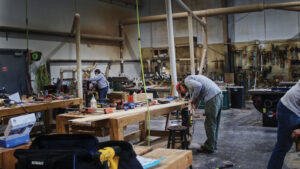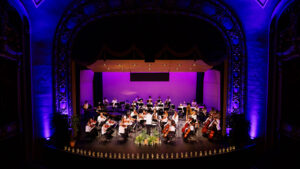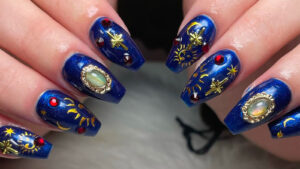You might expect a martial arts enthusiast to thrive on killer instinct, but to Monarch Jewelry owner Ken Greene, the jewelry business is about cooperation, not cutthroat competition.
A one-time serious student of jujitsu, karate and aikido, Greene now teaches tai chi as a volunteer at the Armory Sports Center. He says his interest in the martial arts parallels his jewelry career because the goals are similar. Martial arts students compete, but they also must learn to respect other people and work together to train safely.
It’s the same way in the jewelry business, he says, seated on a metal stool in his Spartan shop at 101 Orr St., just north of Walnut. Behind him, a “secret solution” bubbles in an ultrasonic cleaner, scrubbing a customer’s ring until it shines like new. “I’m performing a root canal on a ring,” Greene says with a laugh.
“Sure we [Columbia jewelers] compete, but we also all collaborate; you’ve got to work together,” he says. “I’ve got to have prices that compete with other dealers. But at the same time, we must work together to maintain industry uniformity. We have standards, and people should conform to them. The good jewelers have to make up for the nefarious jewelers.”
Currently “blood diamonds” are of special concern for customers because of political and humanitarian issues raised by the movie of the same name, but the jewelry industry addressed that issue years ago, Greene says. A bigger problem now for jewelers is helping customers understand the difference between natural diamonds and synthetics, which are created in factories, or simulants, which are made of plastic or glass, usually with a foil backing.
Rebecca Fahrendorf of McAdams’ Ltd. stops by to check on a custom jewelry design job. She says Columbia jewelers work well together because they have different strengths. Greene agrees and says he leans more toward service, while other shops aim more for retail sales.
In addition to repairing jewelry and taking custom design orders, Greene creates his own original pieces. An expert in silver and turquoise, Greene apprenticed in Seattle, Wash., with a student of Charles Loloma, one of the most famous Native American jewelry designers of the 20th century.
“He’s a great guy; he’s a very talented jeweler,” Fahrendorf says of Greene.
Monarch is open every day, although Greene is in the store only on Mondays, Wednesdays, Fridays and Saturdays. On Tuesdays and Thursdays, Greene teaches jewelry courses in the art department at William Woods University. “Why teach?” he says. “Like the old cliché: If you can influence just one, it makes you happy.”
Greene thanks the teachers who inspired him, such as Tom Watson, Roger Fritz and Sid Larson, and says he is passing on what he has learned to the next generation of artists. “They gave me the foundation for what I’m doing now,” he says. “It’s in the artist’s contract to give back. Also, I think it’s really good for these kids to see a black teacher and a black male teacher.”
Greene received his business license in 1984 but had been working with jewelry as a hobbyist since the early 1970s. After his Seattle apprenticeship, he returned to Columbia to earn a bachelor’s degree at Columbia College in 1982, majoring in jewelry with a minor in painting. He first worked as a jeweler with his friend Gary Robinson on Cherry Street and then commuted to Centralia to work for Ralph Robertson, but he soon set up his own shop in Columbia.
The name “Monarch” came from two sources: a quote from former Columbia Daily Tribune columnist Forrest Rose, who once called Greene “The Monarch of North Village,” and the Kansas City Monarchs of the Negro Leagues. As a dedicated baseball fan, history buff and sometimes “autocrat at heart,” Greene says the Monarch name seemed appropriate.
His philosophy? “Always do the best job you can; that’s paramount,” he says. “Be honest and straightforward. That’s what’s important to me.”









